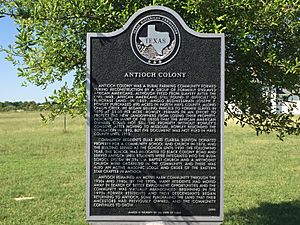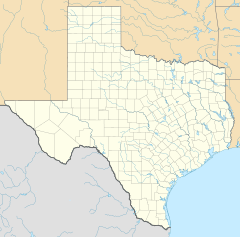Antioch Colony, Texas facts for kids
Quick facts for kids
Antioch Colony
|
|
|---|---|

Antioch Colony Historical Marker
|
|
| Country | United States |
| State | Texas |
| County | Hays |
| Area | |
| • Total | .77 sq mi (2.0 km2) |
| Population
(2009)Estimated
|
|
| • Total | 25 |
| Time zone | UTC-6 (Central (CST)) |
| • Summer (DST) | UTC-5 (CDT) |
| ZIP codes |
78610
|
Antioch Colony is a small community in Hays County, Texas. It's located on Old Black Colony Road, between Farm roads 967 and 1626, just northwest of Buda. It is an unincorporated community, meaning it doesn't have its own local government like a city does.
Contents
The Story of Antioch Colony
Antioch Colony was started in 1870 by people who had been slaves. This was after the American Civil War and the end of slavery. These brave individuals worked hard to build a new life for themselves and their families.
Founding a New Home
Around twelve families bought land from Joseph F. Rowley. They created a farming community together. They raised animals like cows and horses. They also grew crops such as corn, sugarcane, and cotton. This helped them to become self-sufficient.
A Place for Learning
In 1874, Elias and Clarisa Bunton gave land for a school. A two-story schoolhouse was built there. This school was very important for the children of Antioch Colony. It stayed open for many years, teaching generations of students. The school was used until 1961. At that time, schools in Buda became desegregated, meaning students of all races could attend together.
Changes Over Time
Antioch Colony was a busy farming community through the 1950s. However, many residents started moving to bigger cities for work. They were looking for new job opportunities. In the 1970s, some former residents began to return. They helped to bring the community back to life.
Community Spirit Today
In 1997, the Antioch Community Church was built. It stands on the same spot where the original schoolhouse once was. In 2011, people from the community worked together. They successfully placed a historical marker at this location. This marker helps to tell the important story of Antioch Colony for future generations.
 | Charles R. Drew |
 | Benjamin Banneker |
 | Jane C. Wright |
 | Roger Arliner Young |



